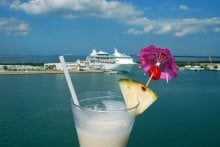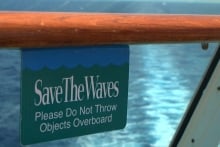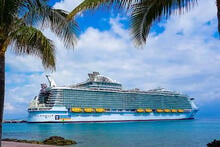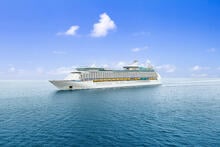Royal Caribbean Associate Vice President of Safety and Environmental Stewardship, Richard Pruitt, talked to a group of reporters during a tour of Explorer of the Seas about the challenges the cruise line is facing in powering their ships in light of new maritime industry emissions regulations.
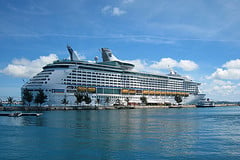 Explorer of the Seas is powered by 6 V12 diesel engines that are connected to 6 12.6 MW electrical generators. The ship was taking on 1,300 tons of fuel during the tour. The Explorer holds two types of marine fuel because US and international law dictate that low sulfur fuel oil must be burned within 200 nautical miles of member-country shorelines, a boundary known as the Emissions Control Area established by the International Maritime Organization.
Explorer of the Seas is powered by 6 V12 diesel engines that are connected to 6 12.6 MW electrical generators. The ship was taking on 1,300 tons of fuel during the tour. The Explorer holds two types of marine fuel because US and international law dictate that low sulfur fuel oil must be burned within 200 nautical miles of member-country shorelines, a boundary known as the Emissions Control Area established by the International Maritime Organization.
New air pollution regulations took effect last August have had a direct impact on cruise ships, and Royal Caribbean "had problems getting compliant fuel in the Pacific Northwest," Pruitt said. Dealing with the emissions issue is currently his greatest challenge, he added.
Compounding the problem is that space aboard a cruise ship is at a premium and the need to carry multiple types of fuel means multiple tanks must compete for precious space.
Pruitt thinks the solution could lie in scrubbers, much like those used by utilities operating coal-fired power plants. He said two ships experimenting with them now "show great promise."
But the regulations are scheduled to tighten even more from less than 1% sulfur fuel now to below 0.1%, which could double fuel costs inside the ECA, according to Pruitt. Scrubbers will likely be required to some extent, he said, because the sulfur content of fuel can only be reduced so much. In order to comply with regulations, some contaminants may need to be scrubbed out after the fuel is burned.


